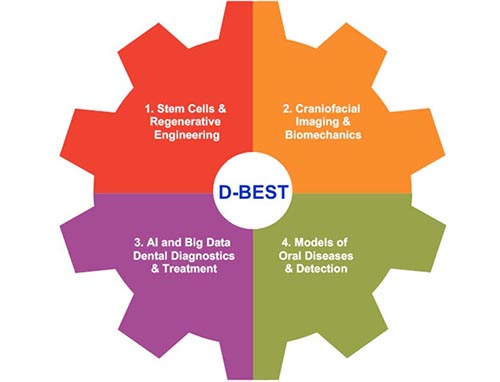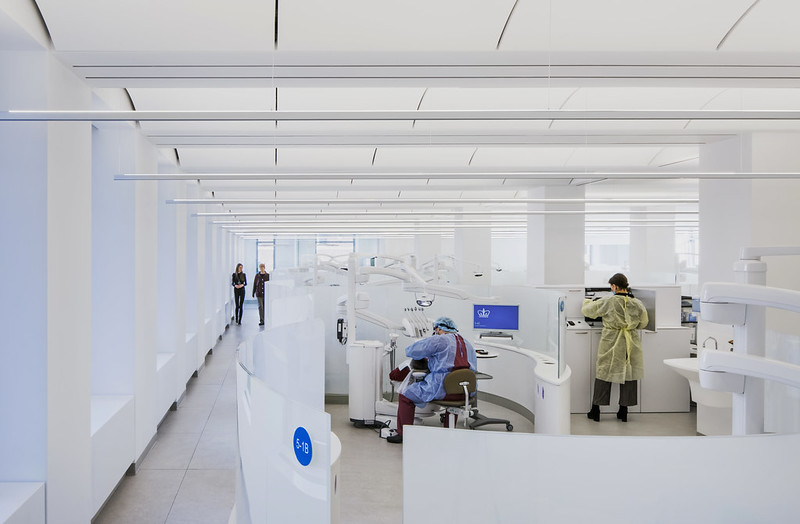MEMBER FOCUS: Columbia SOD’s D-BEST Program Welcomes First Cohort of D.D.S./Ph.D. Candidates
The Columbia University’s Dental-Biomedical Engineering Scholars Training (D-BEST) Program, which received approval from the New York State Department of Education in February 2024, was developed to leverage the growing interplay between the fields of dentistry and engineering. Columbia University’s Fu Foundation School of Engineering and Applied Science and College of Dental Medicine have collaborated to create the Doctor of Dental Surgery/Doctor of Science in Biomedical Engineering (D.D.S./Ph.D.) dual degree program. The program is unique in that it leverages the research and faculty resources of both schools to address the growing need for dentists equipped with expertise in translational research. It offers students continuous biomedical engineering research and dental experiences throughout an eight-year course of study. Funding for the program is provided through a National Institute of Dental and Craniofacial Research T90/R90 Training Grant.

The program’s first cohort is now enrolled. Sean Adams, the first student to be admitted to the D-BEST program as a first-year dental student, was orphaned at 16 and has had an academic trajectory that has not been direct. The 24-year-old student says he didn’t really discover that he could be “good at school” until he was at college. Mr. Adams earned a Bachelor of Science in Mechanical Engineering at the Pennsylvania State University but after internships in that field, realized he imagined a career for himself that was “more people oriented and more creative.”
“I started thinking about health care and landed on dental school,” he said.
After earning his bachelor’s, he spent an extra year at the Pennsylvania State University, taking prerequisites and applying to dental schools. During his interview at the Columbia University College of Dental Medicine (Columbia CDM), he was made aware of a new dual degree program and immediately saw it as a way to integrate his engineering background with a health sciences degree.
Sunil Wadhwa, D.D.S., one of the new program’s developers, along with Helen Lu, Ph.D., its co-director, says that dentistry needs clinicians and academicians who can use new technologies to imagine new ways to treat patients.
“I think that a lot of the practice of dentistry has remained the same for the last hundred years,” said Dr. Wadhwa. “And I think there’s been a lot of focus on the biological aspects.” But, said Dr. Wadhwa, many recent innovations such as Invisalign aligners have been mechanical and have been developed by inventors who are engineers rather than trained dentists. “The goal is to really change the day-to-day practice of dentistry,” he said.
The program has two tracks, and the first track is for predoctoral students with a background in engineering. The program is rigorous overall. Mr. Adams is currently enrolled in the preclinical medical curriculum that is integral to Columbia CDM’s predoctoral education. The D.D.S./Ph.D. training track involves 18 months of dental school, four years doctoral-level biomedical engineering studies and two and a half years of clinical dental training. “Pursuing a dual degree at an Ivy League institution is an incredible opportunity,” said Mr. Adams.

Alexandria Lo, a second-year dental student who enrolled in D-BEST at the end of her first year, completed Columbia CDM’s preclinical studies in December and has just begun her engineering studies. Ms. Lo, who studied biomedical engineering as an undergraduate at Rutgers University, says that she sees the D-BEST program as an opportunity to marry the two fields of study.
The program’s second track admits U.S. and foreign-trained dentists interested in preparing to become independent investigators in dental biomedical engineering research. The first student enrolled on this track is Isabela Sanches Pompeo da Silva, who earned a D.D.S. and a master’s degree in operative dentistry from the University of Sao Paulo School of Dentistry in Brazil.
Dr. Sanches Pompeo da Silva says that she was applying to Ph.D. programs when her mentor, Gordana Vunjak-Novakovic, Ph.D., who holds dual appointments in Columbia’s engineering and dental schools, suggested that she apply to the D-BEST program. Her research interest is in developing biomaterials that can foster dentine regeneration, which aligns with much of the work being done in Dr. Vunjak-Novakovic’s lab.
Dr. Sanches Pompeo da Silva says that the synergy of dentistry and engineering will yield new ways to help people maintain or recover oral health. Dental tissue engineering will be able to restore damaged dental tissue using dental stem cells, seeded on the surface of biomaterials, she said. “I come with the knowledge of histology, tooth anatomy and clinical needs,” she noted.
Courtesy of Columbia University College of Dental Medicine
Published on March 19, 2025
